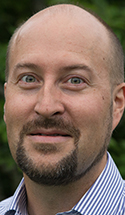Postal address: IFM, Linköpings universitet, SE-581 83 Linköping, Sweden
Visiting address: Fysikhuset, Olaus Magnus väg, Campus Valla
Web address: http://www.ifm.liu.se/
Contact person: Professor Per Hammarström, phone +46 (0)13 28 1255
South Asia Related Research
In November 2015 two researchers from the department were given three year (2016-18) Swedish Research Links grant from the Swedish Research Council for two different South Asia related projects, one in collaboration with researchers in Bangladesh and one with Pakistani counterparts. More information about the South Asia related Swedish Research Links grants 2015.
 Professor Per Hammarström at the Division of Chemistry received SEK 840 000 for a project entitled ”Is Chronic Arsenic Poisoning Associated With Protein Aggregate Pathology?” to be carried out in collaboration with Quazi Quamruzzaman from Dhaka Community Hospital (DCH) in Bangladesh. Dhaka Community Hospital (DCH) has played a pioneering role in bringing the arsenic issue to the attention of the world by detecting the serious health problems caused by arsenic contamination in the ground water of Bangladesh. At present it runs many projects in arsenic affected areas, including testing of tube wells, awareness campaigns, patient management, arsenic mitigation and action research. The next step is this research field is to study the health effects of arsenic among children in Bangladesh. The infrastructure at DCH includes research staff, laboratory facilities, computer networks, and clinical staff that will facilitate the completion of this important project.
Professor Per Hammarström at the Division of Chemistry received SEK 840 000 for a project entitled ”Is Chronic Arsenic Poisoning Associated With Protein Aggregate Pathology?” to be carried out in collaboration with Quazi Quamruzzaman from Dhaka Community Hospital (DCH) in Bangladesh. Dhaka Community Hospital (DCH) has played a pioneering role in bringing the arsenic issue to the attention of the world by detecting the serious health problems caused by arsenic contamination in the ground water of Bangladesh. At present it runs many projects in arsenic affected areas, including testing of tube wells, awareness campaigns, patient management, arsenic mitigation and action research. The next step is this research field is to study the health effects of arsenic among children in Bangladesh. The infrastructure at DCH includes research staff, laboratory facilities, computer networks, and clinical staff that will facilitate the completion of this important project.
 At the same time, Dr. Mikael Syväjärvi , First Research Engineer at the Division of Semiconductor Materials within the department, received SEK 900 000 as a Swedish Research Link Grant for a project entitled ”Subic Silicon Carbide for Solar Driven Applications”. The project is a colloborative effort with Dr. Asghar Hashmi at the Semiconductor Division, Dept.of Physics, Islamia University of Bahawalpur in central Pakistan.
At the same time, Dr. Mikael Syväjärvi , First Research Engineer at the Division of Semiconductor Materials within the department, received SEK 900 000 as a Swedish Research Link Grant for a project entitled ”Subic Silicon Carbide for Solar Driven Applications”. The project is a colloborative effort with Dr. Asghar Hashmi at the Semiconductor Division, Dept.of Physics, Islamia University of Bahawalpur in central Pakistan.
![]() The purpose of this project is to explore the solar energy concepts based on cubic silicon carbide material. The will be possible to realize by the collaboration between Linköping University (LiU), Sweden and The Islamia University of Bahawalpur (IUB), Pakistan. The team at LiU has experience and facilities for growth of the material, whereas the team at IUB has experience and facilities for electrical characterization of material and devices. The long term aim is to realize solar driven devices based on cubic SiC. Such devices include solar cells, water splitting, and biofuel cells. These devices can substantially save energy. In particular, solar cells in developing countries with lot of sunlight can provide energy sources to people that now has poor availability of electricity. The SiC has advantages in concentrated solar cells since the SiC conducts heat very efficiently.
The purpose of this project is to explore the solar energy concepts based on cubic silicon carbide material. The will be possible to realize by the collaboration between Linköping University (LiU), Sweden and The Islamia University of Bahawalpur (IUB), Pakistan. The team at LiU has experience and facilities for growth of the material, whereas the team at IUB has experience and facilities for electrical characterization of material and devices. The long term aim is to realize solar driven devices based on cubic SiC. Such devices include solar cells, water splitting, and biofuel cells. These devices can substantially save energy. In particular, solar cells in developing countries with lot of sunlight can provide energy sources to people that now has poor availability of electricity. The SiC has advantages in concentrated solar cells since the SiC conducts heat very efficiently.
It should also be added that Dr. Syväjärviis muchinvolved in a project by Linköping University researchers in marketing their method of producing Graphene. There is great interest in the Nobel Prize-winning material, which is suitable for things such as high-frequency electronics. Read more.
Indo-Swedish collaboration on Semiconductor Materials

In December 2015, researchers Mikael Syväjärvi and Dr. Ashutosh Tiwari, also from the Semiconductor Materials Division within the department, had meetings with prominent Indian government representatives from the Department of Science and Technology in Delhi. The purpose was to initiate joint Indo-Swedish collaboration on research and innovation changes within the field of Semiconductors Energy and Environmentals Materials. At Linköping University, Syväjärvi and Tiwari are strongly involved in such research, and not the least in applied research on Graphene – a material consisting of a thin layer of pure carbon, hailed as one of the greatest inventions in modern history and awarded with a Nobel Prize in 2010.
The meetings in Delhi were held with Rajiv Sharma, advisor to the Department of Science and Technology regarding strategic programmes, large initiatives and coordinated actions enabler & climate change; Professor Ashutosh Sharma, Secretary, Department of Science and Technology; Dr. Harsh Vardhan, Honarable Union Minister of Science and Technology, Government of India; and Professor Anand Khati, Joint Secretary, Ministry of Earth Sciences.